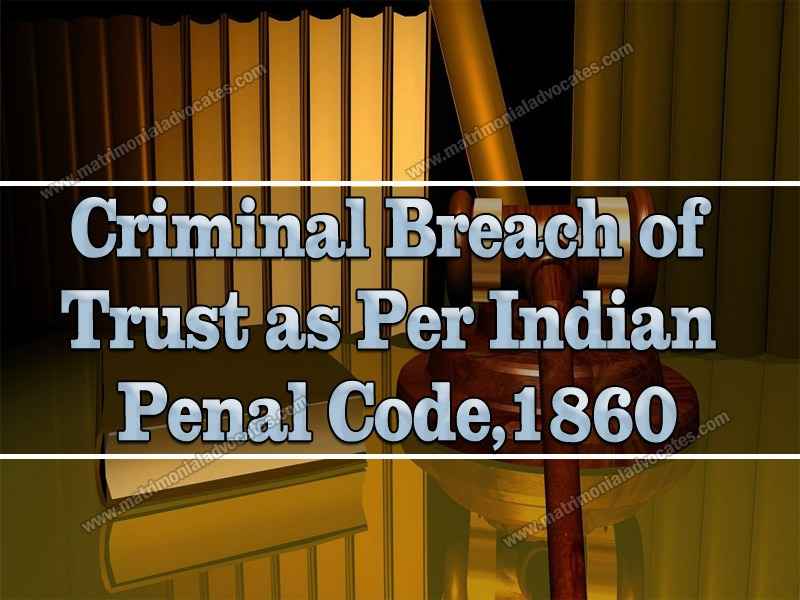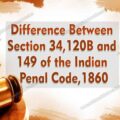
In a civilized society everyone is supposed to be a law abiding citizen .Good faith and trust are the key factors on which most of the interactions in society are still based upon. Trust is one of the key elements to form a tuneful society and for this very reason the criminal breach of trust is treated as an offence in Indian Penal Code, 1860. The basic element of this offence is the violation of trust with respect to the usage of properties.
Criminal breach of trust is a criminal offence according to the provision of Section 405 of the Indian Penal code. This offence is similar to the offence of embezzlement in English law.
MEANING
The meaning and definition of Criminal Breach of trust is embodied in section 405 IPC.1860. It states that whoever being entrusted with property or given dominion over the property, dishonestly misappropriates or converts to his own use that property or dishonestly uses or disposes of that property in violation of any direction of law is said to have committed criminal breach of trust.
In other words if any person is entrusted in any manner with the property or possession of the property and if the person dishonestly uses the property or converts the property or disposes of the property in violation of any direction of law or violation any legal contract, then the other person suffers a criminal breach of trust.
For instance, i) A lend his car to his friend B to use it for transportation. B, instead, uses it for transporting illegal goods like ivory. Here, B is guilty of criminally breaching A’s trust.
ii) If a person who was entrusted with a house while the victim was on a journey dishonestly sells the furniture and uses the money for his own benefit has committed criminal breach of trust.
NATURE OF THE OFFENCE
The offence of Criminal breach of trust fits within those offences that are mentioned in the Chapter XVII of the Indian Penal Code ie. offences affecting property. Meanwhile most of the offences mentioned under this chapter are offences that require physical movement of property by offenders, but some require dishonest intentions. Criminal Breach of Trust fits in such kind of offence.
It is a cognizable and non-bailable offense. It is compoundable by the owner of the property in respect of which breach of trust has been committed, with the permission of the court and is triable by the magistrate of the first class.
Difference between Criminal Misappropriation and Criminal Breach of Trust
In criminal misappropriation, the property comes into possession of the accused in some natural manner. On the other hand in criminal breach of trust the property comes in possession of the accused either by an express entrustment or by some process.
ELEMENTS/INGREDIENTS
Following are the important ingredients to form criminal breach of trust:
1) The accused must be entrusted with the property or with dominion over it,
2) The person so entrusted must use that property, or;
i) Dishonestly misappropriates, or convert to his own use, that property, or
ii) The accused must dishonestly use or dispose of that property or willfully suffer any other person to do so in violation,
(a) of any direction of law prescribing the mode in which such trust is to be discharged, or;
(b) of any legal contract made touching the discharge of such trust.
CONCEPT OF ENTRUSTMENT
Entrustment of a property is an essential requirement before any offense in this section takes place. The interpretation of this section is very wide. The words used are, ‘in any manner entrusted with property’. So it extends to entrustments of all kinds whether to clerks, servants, business partners or other persons, provided they are holding a position of ‘trust’. The term ‘entrusted’ is broad enough to include in its realm all cases in which property is voluntarily handed over for a specific purpose and is dishonestly disposed of contrary to terms on which possession has been handed over. Entrustment need not be expressed; it can be implied.
Jaswantrai Manilal Akhaney vs The State Of Bombay on 4 May, 1956
It was held that when securities are pledged with a bank for specific purpose on specified conditions, it would amount to entrustment. Similarly, properties entrusted to directors of a company would amount to entrustment, because directors are to some extent in a position of trustee. However, when money was paid as illegal gratification, there was no question of entrustment.
CONCEPT OF PROPERTY
The definition in Section 405 does not limit the property to movables or immoveable alone. In the case of :
R K Dalmia vs Delhi Administration (AIR 1962 SC 1821)
The Supreme Court held that the word ‘property’ is used in the Code in a much wider sense than the expression ‘moveable property’. There is no good reason to restrict the meaning of the word ‘property’ to moveable property only, when it is used without any qualification in s 405. Whether the offence defined in a particular section of IPC can be committed in respect of any particular kind of property, will depend not on the interpretation of the word ‘property’ but on the fact whether that particular kind of property can be subject to the acts covered by that section.
CONCEPT OF DOMINION
The word ‘dominion’ connotes control over the property.
In Shivnatrayan vs State of Maharashtra, it was held that a director of a company was in the position of a trustee and being a trustee of the assets, which has come into his hand, he had dominion and control over the same.
CONCEPT OF MISAPPROPRIATION
The essence of Section 405 is dishonest misappropriation .Dishonesty is as defined in Sec.24, IPC, causing wrongful gain or wrongful loss to a person. The meaning of wrongful gain and wrongful loss is defined in Sec. 23, IPC. In order to constitute an offense, it is not enough to establish that the money has not been accounted for or mismanaged. It has to be established that the accused has dishonestly put the property to his own use or to some unauthorized use. Dishonest intention to misappropriate is a crucial fact to be proved to bring home the charge of criminal breach of trust.
Proof of intention, which is always a question of the guilty mind of the person, is difficult to establish by way of direct evidence. In the case of :
Jaikrishnadas Manohardas Desai vs State of Bombay AIR 1960 SC 889.
It was held that dishonest misappropriation or conversion may not ordinarily be a matter of direct proof, but when it is established that property, is entrusted to a person or he had dominion over it and he has rendered a false explanation for his failure to account for it, then an inference of misappropriation with dishonest intent may readily be made.
EXTENDED FORMS OF THE OFFENCE
The Interpretation of this section is very wide. The words used are, ‘in any manner entrusted with property’. So it extends to entrustments of all kinds whether to clerks, servants, business partners or other persons, provided they are holding a position of ‘trust’.
Hence the extended forms of this offence under IPC, 1860 are briefly explained below:
Section 407, IPC
Criminal Breach of Trust by carrier
This section states that when a person is entrusted with a property as a carrier, warehouse keeper or wharfinger commits criminal breach of trust; it is punishable with a jail term of up to seven years which shall also be combined with fine.
Section 408, IPC
Criminal Breach of Trust by clerk or servant
This section states that when a clerk or servant who is entrusted with the property or any dominion over the property in such capacity, commits criminal breach of trust in respect to that property, is punishable with a jail term of up to seven years which shall also be combined with fine.
SECTION 409, IPC
Criminal Breach of Trust by public servant, banker, merchant or agent- This section states when a public servant or banker or merchant or agent who is entrusted with the property or any dominion over the property in such capacity, commits criminal breach of trust in respect to that property, is punishable with imprisonment for life or a jail term which may extend to 10 years and shall also be liable to fine.
PUNISHMENT FOR CRIMINAL BREACH OF TRUST
Section 406 of the IPC, 1860 describes the punishment for criminal breach of trust as imprisonment which may extend up to 3 years which may or may not be combined with fine.
CASE LAWS
Rashmi Kumar vs. Mahesh Kumar Bhada (1997) 2 SCC 397.
The Supreme Court held that when the wife entrusts her stridhana property with the dominion over that property to her husband or any other member of the family and the husband or such other member of the family dishonestly misappropriates or converts to his own use that property, or willfully suffers any other person to do so, he commits criminal breach of trust.
Madhusudan Malhotra vs. Kishore Chandra Bhandari (1988) SCC (Cr) 854.
Even failure to handover marriage gifts and ornaments received from in laws to the wife on being driven out amounts to criminal breach of trust.
Jaswantlal vs. State SCA/938/2012
In this case, the state prima facie sold cement only on the condition that it will be used for the purpose of construction work only. Some portion of cement received was diverted towards a godown. The court held that this amounts to criminal breach of trust. It further helps define the word entrustment as when a person is entitled to hold a property, whereas the owner still remains the same to whom the property belongs.
M.Narayan Ittiravi vs. St. of Travancore-Cochin AIR 1953 478
In this case it was held that in order to attract the offence of Criminal Breach of Trust it is compulsory for the prosecution to prove that the accused was entrusted with the property or dominion over the property. Further it must be proved that he dishonestly misappropriated or converted the property for his own use in violation of a direction of law.
CONCLUSION
It can be concluded that in order to attract the offence of criminal breach of trust , the entrustment of the property or entrustment over the dominion over the property must be there and dishonest misappropriation, dishonest use or conversion must take place with respect to the property entrusted. The offence of Criminal Breach of Trust is very common during these times. People must be taught about the stringent laws regarding this offence.





